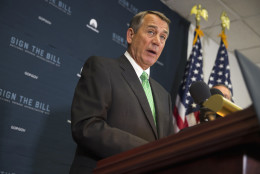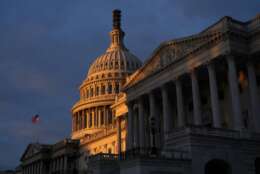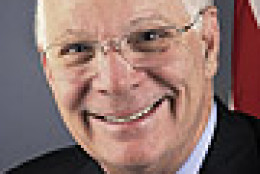Ben Cardin
-
House Speaker John Boehner (R-Ohio) wants to make one last budget deal before he leaves Congress at the end of the week. The two-year deal is expected to designate increases in defense spending as Overseas Contingency Operations funds, and would boost civilian agency spending as well, though not at the levels President Barack Obama requested.
October 26, 2015 -
Reps. Don Beyer (D-Va.) and Rob Wittman (R-VA) introduced the Federal Employee Retroactive Pay Fairness Act, which would secure retroactive pay for all federal employees during a government shutdown, regardless of furlough status.
September 29, 2015 -
In today's news, federal employees can begin signing up for the self-plus one option in the Federal Employee Health Benefits Program when the annual open season starts Nov. 9, Defense Secretary Ash Carter isn’t planning for sequestration as he works with the military services for the 2017 budget planning cycle, and four senators have repeated their call for President Barack Obama to name a permanent inspector general at the Veterans Affairs Department.
September 17, 2015 -
Reps. Chris Van Hollen (D-Md.) and Nita Lowey (D-NY) said there have been few bipartisan negotiations so far, and a new budget proposal from the Republican Study Committee has them particularly worried. Congress has until Sept. 30 to pass some sort of budget resolution that would keep the government open past the end of the month.
September 17, 2015 -
Despite overwhelming agreement that cybersecurity legislation is needed, Senate lawmakers couldn’t agree on how such a bill would look. Lawmakers did approve the nomination of Denise Turner Roth to be GSA administrator.
August 06, 2015 -
UPDATED: A key Senate committee approved an amendment today to give federal employees no less than 10 years of identity and credit-monitoring services and $5 million in liability protection for related damages.
July 22, 2015 -
Lawmakers and good-government groups say the Competitive Service Act of 2015 would reduce duplication among agencies by creating a \"best qualified list\" for similar job openings.
June 17, 2015 -
The Maryland Democrat hosts his third town hall with federal employees since March answering questions on a series of hot-button issues.
June 15, 2015 -
The Maryland Democrat fielded questions from National Institutes of Health employees at a town-hall meeting at the agency's Bethesda headquarters.
April 02, 2015 -
Sen. Ben Cardin (D-Md.) pledged to showcase the work of federal employees during a town hall meeting at the Census Bureau. He also suggested that they brag a little about achievements that seem to go unnoticed on Capitol Hill.
March 16, 2015 -
Sen. Ben Cardin (D-Md.) represents about 300,000 federal employees. He launched a listening tour of sorts Friday, appearing at the Census Bureau offices in Suitland, Maryland, for a town hall event. Federal News Radio's Emily Kopp was in the audience. She joined Tom Temin on the Federal Drive with a report.
March 16, 2015 -
Federal officials routinely cite the fact that they're dealing with taxpayer dollars. Well, what if 90 percent of America didn't pay income tax? The Progressive Consumption Tax Act is a proposal to completely overhaul the tax system. By taxing purchases instead of income, it's designed to encourage savings. But what could the effect be on federal revenues? In the Congressional Spotlight on the Federal Drive, Sen. Ben Cardin (D-Md.) walked Tom Temin through his bill.
March 06, 2015 -
In case of a Friday shutdown at the Department of Homeland Security, the House and Senate have both proposed bills that would give retroactive pay to the agency's 30,000 furloughed employees.
February 25, 2015 -
Companion bills introduced in the House and Senate would give federal employees a 3.8 percent pay raise next year. Federal employees received 1 percent pay raises in both 2014 and 2015, after three years of pay freezes.
January 13, 2015 -
Feds participating in the Federal Flexible Spending Account Program will now be able to rollover up to $500 from one year to the next in unspent funds from their limited expense and health care flexible spending accounts.
September 04, 2014






